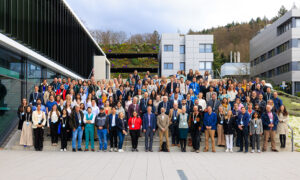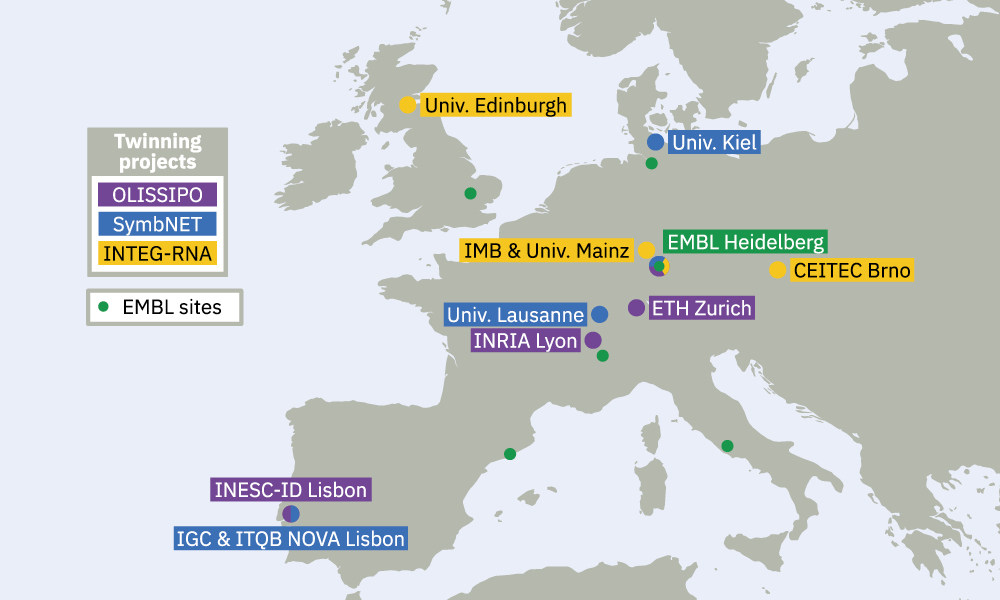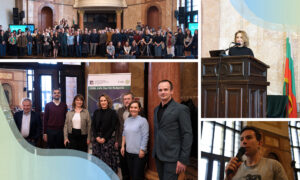
EMBL shares expertise with four European institutes
European Commission grants funding for new Twinning projects involving EMBL scientists

Three international teams involving various research groups and core facilities at EMBL Heidelberg have been granted funding from the European Commission (EC) for three Twinning projects with institutes in Portugal and the Czech Republic. The projects will enable the creation of new research networks and collaborations across Europe. They are funded with €1 million each and will run for three years.
Enabling development
Twinning is part of the EC’s ‘Horizon 2020’ widening programme. It aims to foster knowledge transfer from leading European universities and research institutes to their partner institutions in Central and Eastern Europe, Luxembourg, and Portugal. At least two advanced partners, like EMBL, team up with an institute in these countries to share their expertise through workshops, staff exchanges, or summer schools. Twinning projects thus foster the exchange of knowledge between participants and enable new areas of expertise to be developed and sustained at research institutes based in regions that are less established in research and innovation.
EMBL has previously been involved in two Twinning projects and one Teaming project – a more extensive collaboration for establishing the Hungarian Centre of Excellence for Molecular Medicine. The participation in three new Twinning projects underscores EMBL’s continued efforts to promote collaborative research across Europe and bring together the European life science community.
OLISSIPO: Strengthening computational biology
The Instituto de Engenharia de Sistemas e Computadores, Investigação e Desenvolvimento (INESC-ID) in Lisbon, Portugal, is a non-profit research institution with expertise in artificial intelligence, information and decision support systems, graphics and interaction, distributed systems, communication networks, high-performance computing, nanoelectronics and power systems. The OLISSIPO project aims to bring these disciplines together with biological and biomedical research and strengthen INESC-ID’s research profile in computational biology.
OLISSIPO is a joint effort by EMBL’s Huber group, partners at the French National Institute for Research in Digital Science and Technology (INRIA) in Lyon, the Swiss Federal Institute of Technology in Zurich (ETH Zurich), and INESC-ID. The project will focus on key applications of statistics in molecular biology research, for example in single cell analyses and simulations, and the mathematical modelling of cell–cell interactions. Group leader Wolfgang Huber and his team will contribute their expertise in developing statistical methods and computational tools, and will prepare tutorials, training courses, and outreach activities, and welcome scientists from INESC-ID to EMBL Heidelberg. The ultimate goal of OLISSIPO is to establish a leading European cluster of excellence in computational biology in Lisbon.
SymbNET: Boosting host–microbiome symbiosis research
The Instituto Gulbenkian de Ciência (IGC) is a biological and biomedical research institute near Lisbon. Several groups at IGC study microbial communities – a field in which large-scale genomic and metabolomic analyses are needed to establish causal relations and unravel molecular mechanisms. To strengthen their expertise in this area, IGC and the Instituto de Tecnologia Química e Biológica – Universidade Nova de Lisboa (ITQB NOVA) will collaborate with EMBL, Kiel University, and the University of Lausanne in the SymbNET project.
SymbNET will enable researchers at IGC and ITQB NOVA to expand their research and training capacities in microbiota research and will promote the formation of a European network of excellence in this field. EMBL’s contribution will be coordinated by group leader Kiran Patil and will involve expertise from the Patil, Typas, and Barabas groups, Alexandrov team, and the Metabolomics and Genomics Core Facilities. The unique interdisciplinary research portfolio at EMBL will help researchers from IGC and ITQB NOVA to apply advanced genomics and metabolomics technologies. Involvement in SymbNET further strengthens EMBL’s research and training portfolio in studying organism–environment interactions at the molecular level.
INTEG-RNA: Integrating multidisciplinary RNA research
Research in the field of ribonucleic acid (RNA) biology is becoming increasingly interdisciplinary, involving bioinformaticians, structural biologists, imaging specialists, and biophysicists. To strengthen the RNA research community at the Central European Institute of Technology (CEITEC) at Masaryk University in Brno, Czech Republic, and integrate various disciplines, CEITEC researchers will collaborate with experts at EMBL, the Institute of Molecular Biology (IMB) Mainz, Johannes Gutenberg University Mainz, and the University of Edinburgh.
The INTEG-RNA project aims to establish a cluster of excellence in RNA research in Brno. EMBL’s role in the project is coordinated by Vladimir Benes, Head of the Genomics Core Facility, and involves the group of Director General Edith Heard. EMBL scientists will contribute their expertise in functional genomics analyses and in the technology and data analysis tools used in RNA sequencing and single-cell analyses. In particular, the Genomics Core Facility will conduct scientific courses and training on bioinformatic approaches in RNA research. EMBL’s contribution will help CEITEC to integrate their research groups, methodological approaches, and training of young scientists in RNA biology, and allow their researchers to establish fruitful interdisciplinary research collaborations.
Related links
- EMBL news article on a previous Twinning project with CEITEC
- EMBL news article on the Hungarian Centre of Excellence for Molecular Medicine
- Research in the Alexandrov team
- Research in the Barabas group
- Research in the Heard group
- Research in the Huber group
- Research in the Patil group
- Research in the Typas group
- Metabolomics Core Facility
- Genomics Core Facility


